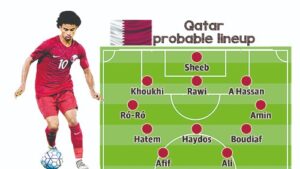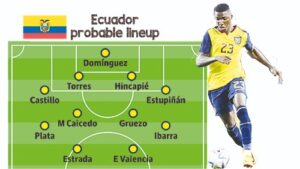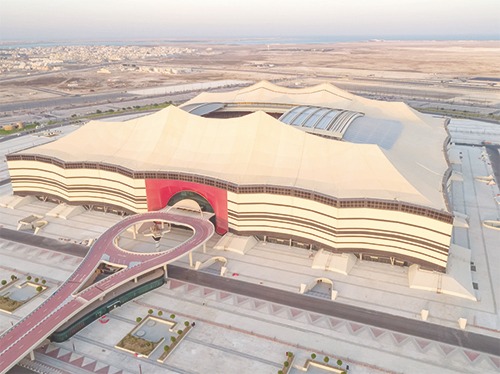Compiled by Sahar el-Zayaty
The FIFA World Cup 2022™ will kick off with an even greater celebration for local and international fans as host country Qatar will play Ecuador tonight at 6pm (CLT) as part of a stand-alone event.
The opening match and ceremony of this year’s tournament at Al Bayt Stadium have been brought forward one day following an unanimous decision taken by the Bureau of the FIFA Council. Consequently, the encounter between Senegal and the Netherlands has been rescheduled from 3pm today to 6pm tomorrow.
The change ensures the continuity of a long-standing tradition of marking the start of the FIFA World Cup™ with an opening ceremony on the occasion of the first match featuring either the hosts or the defending champions. The decision followed an assessment of the competition and operational implications, as well as a thorough consultation process and an agreement with key stakeholders and the host country.
The Qatar Stars League has been on pause since the middle of September as the national team entered an early and intensive pre-tournament training camp. The coach, Félix Sánchez, has enjoyed the luxury of working with his side in Vienna and Marbella, taking in friendlies against Canada, Chile, Nicaragua and Guatemala. A lack of preparation can be no excuse for the hosts.

They kick off the World Cup having played 10 European friendlies, won the 2019 Asian Cup, performed well at the 2019 Copa América and reached the semi-finals of the 2021 Gold Cup.
There were suggestions Sánchez’s side had peaked too soon, particularly after being overwhelmed by Serbia and Portugal last year and then losing 2-0 to Canada last month. But a 2-2 draw with Chile has renewed optimism.
Familiarity is their strength and Sánchez has long employed either a 3-5-2 or 5-3-2 system, the former designed to retain the ball, the latter to counter against it. This is a side brimming with technically proficient players: Akram Afif buzzes in behind the predatory Almoez Ali while the ball is funnelled down the left channel for the galavanting Homam al-Amin.
This is a lightweight side, however, and how they fare without the ball is a big concern. “Tough matches await us in the tournament,” Sánchez said recently. “We will face very strong teams – teams that are used to being in the World Cup. If we display our best, we will be able to compete.” You won’t hear much more than that from the team right now. Sánchez has his squad in complete isolation in Marbella, with the Spanish newspaper Diario AS commenting that when Liverpool were based there before the 2019 Champions League final you at least saw them go for a bike ride.
Félix Sánchez has been in Qatar since 2006 and has worked his way up from the Aspire Academy, through the Qatar youth teams before landing the senior job in 2017. He failed to guide them to the 2018 World Cup but the 2019 Asian Cup triumph more than made up for that disappointment.
Qatar’s star Akram Afif is coming back into form at just the right time. Injuries and a rumoured falling-out with Xavi towards the end of the coach’s Al Sadd spell had led to a loss of consistency for Al Annabi (the Qatar national team) but the recent friendlies have indicated he is primed for the World Cup. An electric forward, on his day Afif can beat any defender and justify his status as one of the best players in Asia. “He’s an unbelievable talent, a big player. I have told him many times that he’s an amazing player,” Xavi said of Afif after winning the league title in 2020.
So much rests on the shoulders of Al Duhail’s Bassam al-Rawi as the central pillar of the defence but his head could also turn out to be crucial. The centre-back is a big set-piece threat and that will be a route to goal for the hosts. He is diminutive but very combative and he will set the tone when they’re under pressure so if he stands firm, so will Qatar.
The Ecuador team was built from scratch when the unheralded Argentinian Gustavo Alfaro came in to bring some stability after the short and unsuccessful tenures of Hernán Darío Gómez, Jorge Célico and Jordi Cruyff (who left without taking charge of a single game). The road to Qatar looked long and winding when Alfaro took over in 2020 but he discarded the old guard of Antonio Valencia, Christian Noboa and Felipe Caicedo to make room for youngsters such as Piero Hincapié, Moisés Caicedo and Gonzalo Plata among others. “It was all about getting our teeth into the challenge and making our mark on the project without altering the essence of Ecuadorian football, while at the same time introducing new elements to try to reverse the dynamic that resulted in Ecuador failing to qualify for the 2018 edition in Russia,” he told Fifa.com.

Alfaro is not afraid to change tactics depending on the opponent but 4-4-2 is the most common formation.
There have been increased flirtations with 4-3-3 but the 3-5-2 system utilised at times during qualifying has not been seen since.
Ecuador were the youngest team to qualify from South America with an average age of just over 25. Sadly some key players have sustained serious injuries: São Paulo’s Robert Arboleda tore ankle ligaments in June, while Ayrton Preciado of Santos and Joao Rojas of Monterrey are also set to miss out.
Ecuador qualified for Qatar by finishing fourth in the South American section, two points ahead of Peru, who had to go to an intercontinental playoff, which they lost to Australia. There was controversy with Chile and Peru trying to get Ecuador thrown out of the World Cup because they had fielded an ineligible player, Byron David Castillo. Fifa ruled in Ecuador’s favour with Cas (the court of arbitration for sport) upholding the decision on November 8 and handing Ecuador a three-point penalty for 2026 qualifying instead.
Equador’s coach Gustavo Alfaro had a short playing career for his hometown club Atlético de Rafaela, in Santa Fe, Argentina, but retired in 1992 to focus on coaching. Thirty years later he will be at the World Cup having earned the affection of the Ecuadorian people for the way he speaks and represents the national team, and the confidence he transmits to his players. Alfaro had coached several clubs in Argentina, including Boca Juniors, as well as Al Ahli in Saudi Arabia when he took over Ecuador 30 days before their first World Cup qualifier, in the middle of the pandemic. “It wasn’t easy,” he admitted. After Ecuador had qualified for Qatar he said in a rousing speech: “The challenge was a blank wall where they had to hang their picture of making history.
Without a doubt the star of this team is Moisés Caicedo or as he likes to be called, “Niño Moi”.
The Brighton dynamo has become an indispensable part of the team, providing balance and defensive structure. As a box-to-box midfielder, he contributes to the attack but also helps out his backline. The Brighton coach, Roberto De Zerbi, calls him “one of the best midfielders in the Premier League,” adding: “Caicedo is a top player with and without the ball. There are many players who are very good with the ball but without it in defensive spaces are not so good. With Caicedo I can’t see anything not at the top level.” Caicedo is not your typical star player. He will not score a bicycle kick from the halfway line or dazzle opponents with silky skills, but his effective passing, great positioning and game-reading intelligence could be pivotal in Ecuador’s attempts to progress.
Ángel Mena does not always shine brightest in a game – and is sometimes even on the bench – but he is enormously valued for what he does on and off the pitch by everyone in the squad. One of the most experienced players of La Tricolor, Mena’s intelligence enables the team to play the high-speed football the coach prefers. He is a left-footed winger with great vision and a superb shot. Now 34, he has been with the Mexican side Club León since 2019.






Discussion about this post